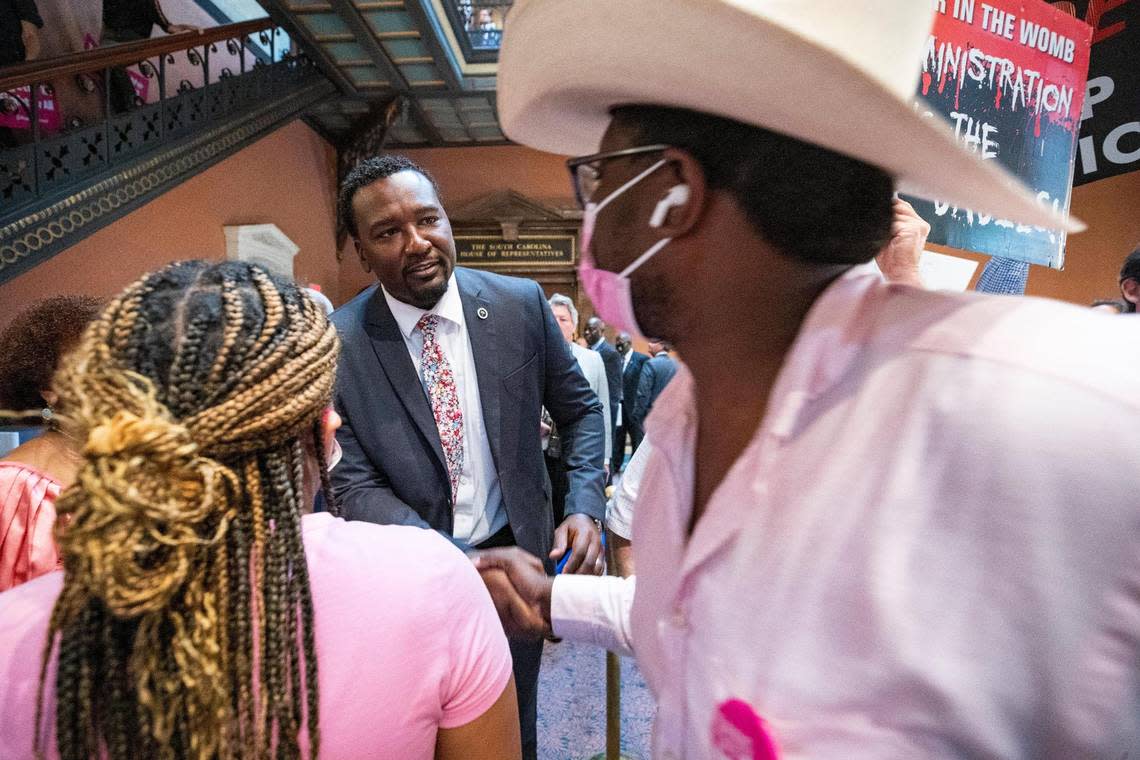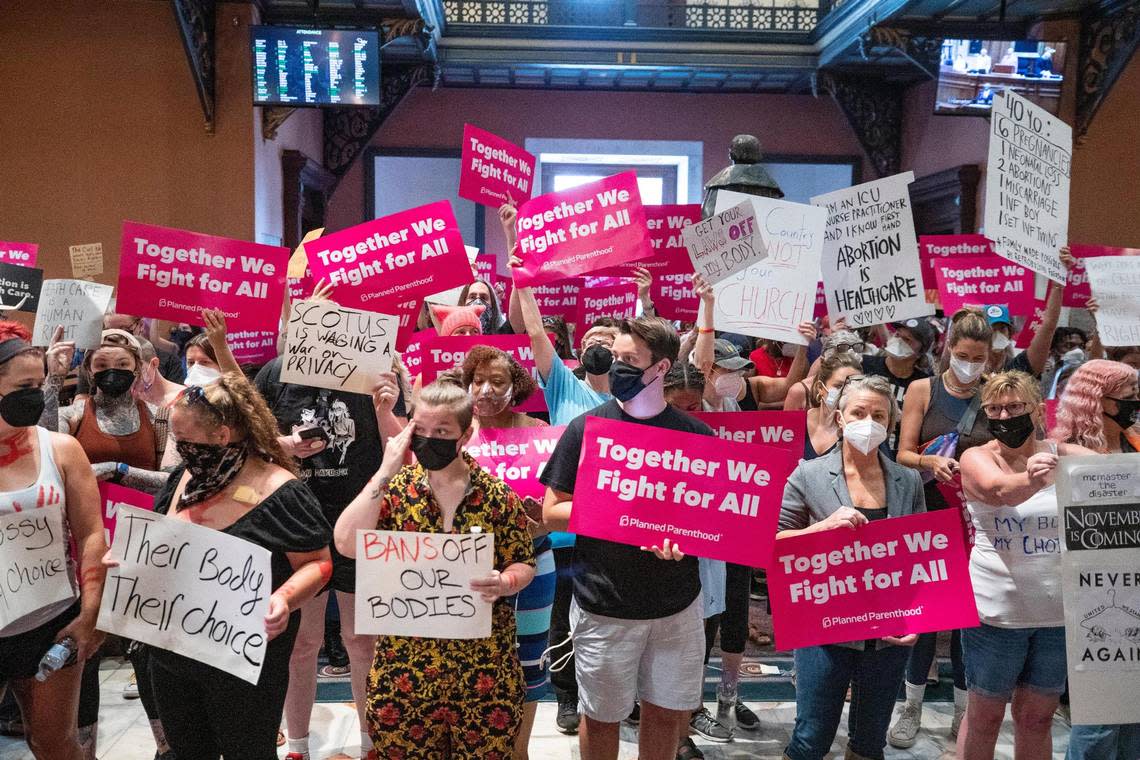With ‘sense of urgency,’ will abortion be key midterm issue for SC Democrats?
Christale Spain, the founder of the 46 Hope Road PAC and a seasoned South Carolina political organizer, said this year’s election cycle is different.
In the wake of the U.S. Supreme Court’s decision to overturn Roe v. Wade and the S.C. Legislature’s preparations for passing further anti-abortion legislation, Spain said that getting Democrats and more progressives candidates in office is urgent now more than ever.
“It’s a way for us to show our voters that nothing is set in stone,” Spain said. “All these rights and privileges that we have been afforded throughout our lifetime can be easily taken away.”
Democratic organizers and politicians say they hope voters have that same urgency in November. But in a midterm cycle looking to favor Republican gains at the ballot box, S.C. Democrats have several hurdles to overcome in upcoming months.
One of those hurdles is figuring out a nuanced organizing strategy around abortion.
Another is internal strife, fueling calls from Democratic leadership to unify in the months ahead.
Republicans haven’t made the path to the midterms easier for Democrats, either, with inflation and high gas prices being pushed as key issues ahead of the midterms. Democrats, especially those running in competitive House races, will have to weigh the importance of abortion against pocketbook issues in their districts.
Political analysts say the abortion debate only has the possibility of shaking up a few competitive races this year.
One district Democrats hope to flip — South Carolina’s 1st Congressional District, which went blue for Joe Cunningham in 2018 — might not be an easy task this year.
Abortion has done well for Democrats in terms of fundraising. They’ve raised more than $80 million to Democratic groups in one week after the overturn of Roe, the Associated Press reported. Donations mostly focused on national campaigns, leaving many state races at a disproportionate disadvantage.
The Supreme Court hasn’t only motivated Democratic voters. It’s also historically energized Republican voters.
Jaime Harrison’s campaign for U.S. Senate, which shattered fundraising records, came up 10 percentage points short in the 2020 election against Republican Sen. Lindsey Graham. One major factor in Graham’s victory became apparent: the confirmation of Supreme Court Justice Amy Coney Barrett.
Although he trailed Harrison in fundraising during his campaign, Graham had his largest amount of donations in one day — $5.1 million from 80,000 donors — during the third day of Barrett’s televised confirmation hearing on Oct. 14.
While the full impact of abortion on the current midterm cycle is yet to be felt, state lawmakers like Rep Beth Bernstein, D-Richland, have affirmed Democrats’ efforts to stand up against anti-abortion laws, but also stressed the necessity for South Carolinians to vote.
“We will continue to fight, but it will be an uphill battle for us because our numbers are not quite in the General Assembly,” Bernstein said at the Planned Parenthood “Day of Action” press conference. “So we will need help in November.”
Dem organizers need to ‘meet people where they are’
Bryanta Maxwell, Democratic National committeewoman, said she remains hopeful that women in particular this year vote “in their interest and not against their interest.”
But mobilizing people to vote can’t just fall on the voter. Maxwell said organizers have a lot of work to do.
Democrats need to run television, radio and billboard advertisements about abortion in droves, Maxwell said. She said Democrats should not only highlight it as a women’s health issue, but a privacy issue.
Organizing around abortion isn’t a sure solution to every Democrat running for office in South Carolina. Maxwell, who has worked on Democratic campaigns, suggested that campaigns conduct polling, and if abortion isn’t a top issue in a candidate’s district, they shouldn’t run on it.
Cunningham, the Democratic nominee for governor, has vowed to make abortion a primary platform point for his campaign. He previously told reporters he would veto a total abortion ban “so hard, it’ll make your head spin.”
Trav Robertson, the chairman of the South Carolina Democratic Party, said there are ways to make abortion a top issue among voters.
Reminding voters of Republicans’ stances on abortion, specifically when it comes to the exceptions of rape and incest, is one key component to Democratic organizing, and ensuring candidates and organizers are well-versed on what it means for reproductive rights, he said.
“You just got to meet people where they are. Don’t tell people what you want to do, you need to find out what they want from you.” Maxwell said. “You need to go out into the communities and have these much-needed conversations.”
‘Old playbooks’ and ‘coming together’
In order to be successful in their organizing, Democrats need to put aside their differences and come together in November, Robertson told The State.
“We don’t give up the battle and the fight because it’s hard. We stay in it because it’s the right thing to do,” Robertson said. “And we’re only going to do that if we’re unified and together.”
Although most Democratic sentiment places anger about Roe on Republicans, some South Carolinians have also been frustrated with Democratic leadership.
Jada Orme, a protester at a June 28 abortion rights rally at the State House, was doubtful of Democrats’ action on abortion.
“It’s a platform that continuously runs, that they know will get voters, they know will get money, they know will get donations, and if they codified (abortion) into law, that’s not a platform anymore,” Orme said.
The U.S. House passed two bills, mostly along party lines, that would put Roe into federal law and protect a person’s right to travel for a legal abortion. The bills are expected to die in the Senate, unable to overcome the 60-vote filibuster needed to be signed into law.
Becci Robbins, the communications director of the nonpartisan group S.C. Progressive Network, said she’s seen some discontent among progressives within the Democratic Party, but it’s on more of a national stage.
She called laying the blame on Democrats for the overturn of Roe the “worst kind of gaslighting,” emphasizing the need to mobilize against Republicans.
Though Democrats are doing what they can, Robbins said they need to change their strategies and put forth better candidates.
“God bless the Democrats for trying what they can but again, they’re using an old playbook,” Robbins said. “And you know, when you still believe that working across the aisle is a possibility, that’s a pipe dream now post-Trump.”
Robertson said the time of Democrats classifying themselves as progressives, liberals or moderates needs to be over. The only way to move forward and win elections is to be unified, he said.
“This is not the time for finger-pointing at other Democrats,” Robertson said. “It is the time for joining together and motivating in one unit and moving forward as one voice and a collective body in order to save the medical freedom of women.”
Democrats have ‘uphill battle.’ But is the GOP ‘playing with fire?’
As far as Republican strategy goes, the real battleground of ideas took place in the primary election, not the ongoing post-Roe abortion debate, said Dave Wilson, president of the conservative Palmetto Family Council.
That’s not to say abortion won’t be a factor in the midterms, though, he said.
Wilson said Republicans’ true campaigning on the issue will come from what position they take on anti-abortion legislation during the special legislative session this year. For many retiring members, Wilson said, this is their “last stand” on the issue.
“The actions that the Legislature takes in these next few weeks is a real statement about their stance on the issue of life,” Wilson said.
Miles Coleman, associate editor of Sabato’s Crystal Ball, said abortion likely won’t change the “fundamental trajectory of the midterms,” which shows the Republicans in a good position to make advances in the U.S. House and Senate.
Abortion could push marginal races in the Democrats’ favor, though, Coleman added.
He said inflation will probably be the biggest issue in the minds of many voters. David Wasserman, U.S. House of Representatives editor for Cook Political Report, agreed.
“Whether it’s the war in Ukraine, Uvalde or overturning Roe v. Wade, we noticed when the leaked draft came out, Democratic enthusiasm surged a little bit and then the conversation went back to inflation,” Wasserman said.
In South Carolina, the district many Democrats hope to flip remains the 1st District on the coast, where Democratic candidate Annie Andrews faces off against Republican incumbent Nancy Mace. Coleman and Wasserman are both skeptical of the seat being considered “marginal” anymore.
In 2018, Cunningham flipped the historically Republican district blue, later losing to Mace in 2020. The last redistricting cycle in South Carolina made the district a steeper challenge for Democrats, as parts of Charleston County that assisted Cunningham in his win were drawn to be included in House Majority Whip Jim Clyburn’s district.
Wasserman said that Andrews’ best path to victory included Trump-backed candidate Katie Arrington beating Mace in the Republican primary — allowing her to bring together a voting coalition of “Democrats, independents and Trump-skeptical Republicans.”
Andrews’ job as a doctor could make her a “good messenger” if abortion becomes a more salient issue in the 1st District, but only time will tell, Coleman said. He also wouldn’t be surprised if the race was made a bit closer because of abortion.
South Carolina state House races could be more in play for Democrats, especially in more marginal seats in Charleston and Richland County, Coleman told The State. With a total abortion ban as a possibility in South Carolina, Coleman said Republican legislators could “potentially be playing with fire.”
“This is one of these things where you could potentially help the Democrats in the Legislature if Republicans go too far,” Coleman said.




